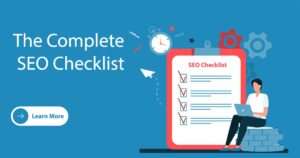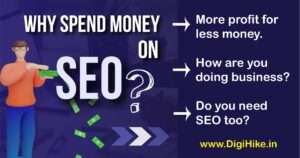What is the difference between on-page and off-page SEO?
Hello friends! Once again, welcome to digihike.in. In this junior-to-senior class today, we will learn about the difference between on-page and off-page SEO. Many people are involved in SEO (Search Engine Optimization) or digital marketing. They do not know what on-page and off-page SEO are. Sometimes they come to understand that both are the same. But this is wrong. Both have different functions in digital marketing. Both have different benefits.
On-page and off-page SEO
On-page SEO:
Let us first know what on-page SEO is. The simple answer is to optimize your website according to the search engines. That is, optimizing the website in such a way that the search engine likes it more and provides maximum traffic and a good rank.
Under on-page SEO, you have to make changes to the title, description, Keywords, heading, image alt tag, sitemap, and robots.txt of your web page, etc. Apart from this, you also have to change the keywords according to the content of the web page and the search engine. By doing this, the search engine gives a good rank to your web page, and at the same time, you also get good traffic.
You also need to know a little bit of HTML source code to make this work. If you know about it, then you can do very good on-page SEO.
Many people also know on-page SEO as on-site SEO. Also, some people think of this only to improve search visibility, which is completely wrong. It has several main aspects. Let’s understand.
Key Aspects of On-Page SEO
- Page title: As its name suggests, under this, you have to improve the meta title on the web page. Through On-Page SEO, you have to give a name to the web page that can fully affect the content of the web page. Along with this, you should keep the title of the web page in such a way that the main keywords of the web page are included in it.
- Meta Description: Under this, you have to write a short summary of the web page. It should be written in such a way that the main keywords of the title of the web page and the main meaning of the content of the web page are understood.
- Tags: Under this task, you have to write some tags for the web page, which are a kind of keyword. To write it, you have to first read the content of the page thoroughly. Then the tags have to be written separately by separating the keywords included in the content.
- URL Structure: While writing a web page, we have to write many types of Headings and subheadings. It should be Search engine-friendly. You should also include the Main Keyword of the Web Page in the heading and subheading. If you know about HTML code, then you will know about H1, H2, H3, H4, H5, and H6 tags. These are Heading Tags. It is used in the body of the content of the web page. The most important keywords on the web page should be placed in the H1 tag. Then, according to priority, H2, H3, H4, H5, and H6 should be written as headings. This should be given special attention while optimizing the web page.
- Heading Tags: While writing a web page, we have to write many types of headings and subheadings. It should be search engine-friendly. You should also include the main keywords of the web page in the heading and subheadings. If you know about HTML code, then you would know the H1, H2, H3, H4, H5, and H6 Tags. These are Heading Tags. It is used in the body of the content of the web page. The most important keyword on the web page should be placed in the H1 tag. Then, according to priority, H2, H3, H4, H5, and H6 should be written as headings. This should be given special attention while optimizing the web page.
- Keyword Density: While writing a web page, take full care of Keyword Density. When you are including keywords in web page content, keep in mind not to repeat them more than necessary. Use it where it is useful. Many times, some people repeat the same keywords so many times while writing content that it seems that it is written intentionally. By doing this, it is useless to read the article, and the search engine ignores the content, considering it a to be stuffingDue to this, the rank of your web page goes down on the search engines, and your traffic also goes down. That is, avoid keyword stuffing.
- Image Alt Tag: Many times, while creating a web page, we have to include the image in the web page. This makes your web page look attractive. Whenever you use an image in a web page, you must write the alt tag of that image. Because it tells the search engine what the image is about.
- Internal Linking: Whenever you upload a web page to your website, at that time you must do internal linking in the content of your web page. It improves the navigation and crawling of your website. While doing internal linking, keep one thing in mind: apply it to a keyword that you have already created a page for. On the same keyword, make internal links to its related pages only.
- Copy Content: While uploading the content for the web page, check that the content is not copied from any other web page or any other website. If so, don’t include it on the website. The content of any website plays the role of king. If your content is unique and well understood, then you will get a good rank on the search engines. As a result of which you will get good traffic.
- User Interface: The user interface of your web page should be such that visitors can easily understand and use it. The user should have easy-to-read web pages.
- Responsive web page: Your web page should be developed in such a way that it can respond according to the device. That is, you can adapt yourself to any device. For example, if the visitor is visiting the web page on the desktop, then the web page should look good on the desktop. If the visitor is visiting your web page on mobile, then the web page should look good on mobile. This is how your web page should be displayed on other devices.
- Web page speed: The speed of your web page should be good. If the speed of your web page is not good, then the user will not be able to visit your web page properly. Search engines will also not give value to your web page. If you are doing on-page SEO, then definitely check the speed of the web page, and if there is scope for improvement, then definitely do it.
- Web Page SSL Certificate: If you are doing on-page SEO for a website, then first of all, you should check the security of that website. Check if the SSL certificate is installed for that website. If not, get it done as soon as possible. Only after that can we start doing its on-page SEO.
- Site Map: While doing on-page SEO of the website, check whether the site map of the website is made. If not, get it done as soon as possible.
-
Robots.txt: Before doing on-page SEO of the website, first make the Robots.txt file of that website. This tells the search engine which pages to crawl and which not.
Off-page SEO
Off-page SEO is the process by which your website is promoted through other websites. To do this work, one has to get links and link juice from another website so that the popularity and value of your website increase in the search engines.
By usingoff-page SEO, you increase the authority of your domain by getting traffic from links on other websites. When you perform this action, it shows the search crawler how important and valuable your website is. It also tells search engines that a page is a good search result because the brand and website are authorized and popular.
Let us see below what is done under off-page SEO. Until you understand it, you will not be able to understand the difference between On-page SEO and off-page SEO properly.
Key Aspects of Off-Page SEO
- Social Media Optimization: To do this off-page SEO, first you have to check how much your website is worth on social media websites. Social media includes many types of websites, such as Facebook, Twitter, Instagram, LinkedIn, Telegram, YouTube, etc. On these websites, you have to create your business page. After this, the links and posts on your website have to be shared daily. So that people can visit your website through social media. They play a huge role in increasing your brand’s awareness. Today, the more you optimize your website’s social media pages, the higher the value of your brand will be. Therefore, by recognizing its power, optimize your social media page.
- Blogging: Blogging is a very good way to increase the ranking of a website and its search engine value. But before doing this, you have to understand the instructions and purpose of blog posting. Guest posting should be done to increase the Domain Authority of your website. This is the best way to blog.
- Forum Posting: To perform this off-page SEO task, find online forums related to your website. Then answer your question by looking at the questions and answers given by other people on it. During the answer, you can mention the features of your website there.
- Social Bookmarking: This function of off-page SEO is also very popular. Many people work to increase the brand awareness of their websites through social bookmarking. By bookmarking your website on social bookmarking sites like Digg, Delicious, Reddit, etc., you can get a lot of value from your website on the search engine. For your convenience, do social bookmarking on your website by clicking on the social bookmarking list provided here. >> Best Social Bookmarking Sites List 2022
- Link building strategies: By doing this, you build external links to your site to bypass your competitors and improve your rank. To do this off-page SEO activity, first of all, you should analyze your competitors. Then, after that, create more and more do-follow links through link-building strategies. To create high-quality dofollow links, click on the link given here and understand it carefully. >> Which Strategy is Best to Create Dofollow Backlinks?
- Press Release: If you want to get a good bank link for your website, then make a Press Release Presentation and submit it. You can create a presentation of the event for your business and post it through a press release. If you want, you can distribute it in different media so that your website can reach as many people as possible. This can give your website a very good response on the search engine.
- Content Marketing: To do off-phase SEO, write content that people share on your web page or submit a reference link to your web page. It can be made as a video, podcast, text, etc. While preparing content for content marketing, keep in mind that it should contain the domain of your website. If you want, by spending a few rupees, you can get it shared by other people through paid marketing.
Lastly, we give you the sorting highlights of the differences between on-page SEO and off-page SEO so that you can remember the difference between them.
Conclusion: We hope that you have understood the difference between on-page and off-page SEO properly. When you bring this into your practice, it will make more sense. We wish you all the best for your progress in the field of SEO.



